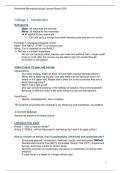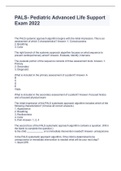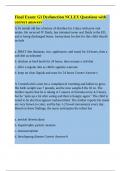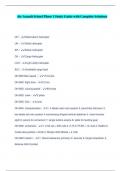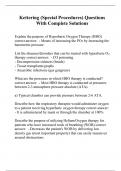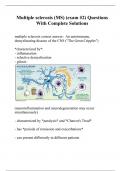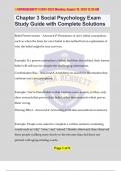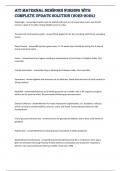College 1 - Introduction
Syllogisms
- Major: all mammals are animals
- Minor: all elephants are mammals
- → all elephants are mammals
• Can add up to a wrong conclusion because premises are not correct
Example in neuropsychological conext:
Major: The RAVLT (15WT) is a memory task
Minor: Tim is impaired on the RAVLT
→ Tim has a memory impairment
- No not true because other reasons can make him perform ‘bad’; maybe deaf?
- Keep in mind..after this course you are able to go from model through
innovation to the patient.
Video Casus 73-year-old women
Observations:
- Not really looking, might be blind, left and right occipital damage (stroke)
- When she is touching the pen; she only feels one half because she’s not
aware of the upper half. Maybe she is blind but is not conscious that she is
blind (antonagnosia)?
- Didn’t notice light go off
- She saw someone passing in the hallway of hospital. How is that possible?
Because of different route in the brain without consciousness/present
Hypothesis:
- Spatial, prosopagnosia, she’s unaware
The purpose of showing this example is; by observing and hypothesis, be creative.
→ Current behavior
Need to be aware of all these factors:
Literature this week
Article 1: how to read an article?
Article 2: DSM-5 - will be discussed in last lecture but read it to apply article 1
How to choose an article, read it purposefully, effectively and systematically?
- Structured abstract: introduction, methods, results, and discussion (IMRAD)
- Randomized Control Trial (RCT), Controlled Clinical Trial (CCT), Experiment,
Survey, and Case-control or Cohort study
- Reviews could be non-systematic (narrative) or systematic (including meta-
analysis)
- A case study is a report of a single clinical case
1
,Advanced Neuropsychology Lecture Notes 2024
Dust of.. Neuropsychological examination
Test performance never stand on itself it is always a summation of factors:
Cognitive models
2
,Advanced Neuropsychology Lecture Notes 2024
Task impurity
Task impurity
= no task measures only what you want to measure. A task always measures more
than one skill, making the results less clear.
- Example: the score on an executive functioning (EF) task is determined by
many factors
- Example: go back to the syllogism about Tim and RAVLT memory test, it can
be linked to task impurity.
- It’s not only a disadvantage. It also gives handhelds to understand behavior in
the whole, so that is a good point.
Example exam question (by me): Task impurity seems like an disadvantage, but it is
also a good thing. Explain the advantage?
It also gives handhelds to understand behavior in the whole, so that is a good point.
An experiment
What is an experiment?
Forms of experiments
There are several forms of experiments:
- Behavioral experiments: micro
- Pop-up experiments: meso
- Big data: macro
• When reading an article, keep in mind which scale it is.
Experimental set up…
- Reliable
- Valid
- Feasible
3
, Advanced Neuropsychology Lecture Notes 2024
- Theoretically sound
- Data friendly…
- Ethical
Hypothesis = KEY!
Ethics
- Rules and regulations, values, research, moral principles, ethical practices,
rules of conduct
Example exam questions
Q1:
a) History taking through a clinical interview is of high relevance. Come up with 4
elements a good clinical interview should be built upon, and argument them briefly (1
to 2 sentences maximum). (uitgebreid in college en slides behandeld; 0.5 pt + 0.5 pt
if the argument is OK; maximum 4 pt)
1. The interview should be structured - Structure is important to help the patient
provide you with all the necessary information, to address most aspects
2. The interview should be hypotheses-driven - Without a hypothesis an interview
lacks the sharpness to get all information out and, moreover, to make sense of
this information and to know what to ask next
3. The interview should be built on mutual respect and feeling of safety -
Explaining what you don’t understand yourself or what is your biggest fear is
not easy and this asks for trust in the professional.
4. The interview should be built upon (easily accessible) theoretical knowledge of
cognitive models - This is closely linked to the hypothesis. It is your duty to
integrate the information you get from the patient with your theoretical
knowledge.
5. The interview should take the context of the patient into account (e.g.
expectancies, culture, cognitive impairments) Behandeld in college next level.
b) Neuropsychological tasks are meant to elicit behavior in such a way that it helps to
understand possible changes in that behavior. This comes with some pitfalls, one of
which is task impurity. Explain what is meant with task impurity (2 pt) and provide an
example of it (2 pt).
Task impurity refers to the fact that any cognitive task never measures ‘only’ one
concept, is always asks for other function to come up with the good
behavior/response (2 pt). An example is a test for verbal memory. This refers not only
to verbal memory but also to language function (if you have no understanding of the
words you have to remember, this seriously hampers your performance) or any other
example in this line of reasoning (2 pt). behandeld in college introduction
4


